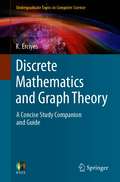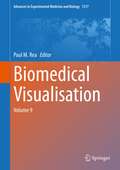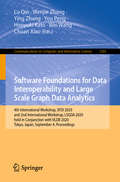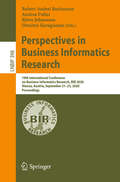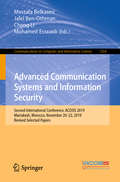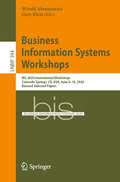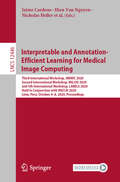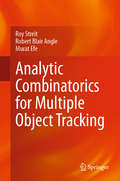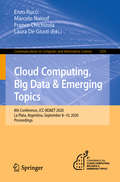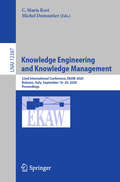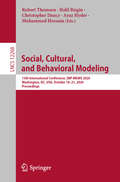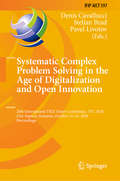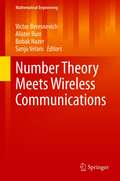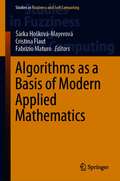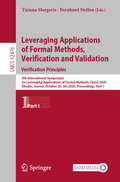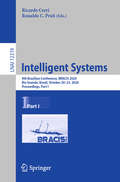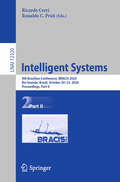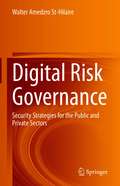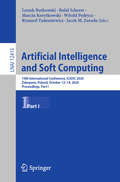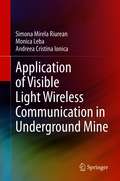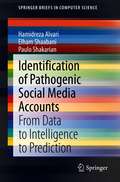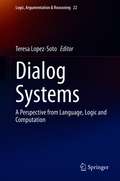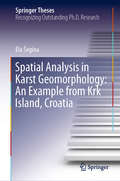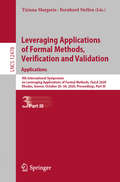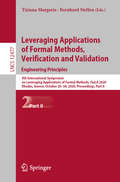- Table View
- List View
Discrete Mathematics and Graph Theory: A Concise Study Companion and Guide (Undergraduate Topics in Computer Science)
by K. ErciyesThis textbook can serve as a comprehensive manual of discrete mathematics and graph theory for non-Computer Science majors; as a reference and study aid for professionals and researchers who have not taken any discrete math course before. It can also be used as a reference book for a course on Discrete Mathematics in Computer Science or Mathematics curricula. The study of discrete mathematics is one of the first courses on curricula in various disciplines such as Computer Science, Mathematics and Engineering education practices. Graphs are key data structures used to represent networks, chemical structures, games etc. and are increasingly used more in various applications such as bioinformatics and the Internet. Graph theory has gone through an unprecedented growth in the last few decades both in terms of theory and implementations; hence it deserves a thorough treatment which is not adequately found in any other contemporary books on discrete mathematics, whereas about 40% of this textbook is devoted to graph theory. The text follows an algorithmic approach for discrete mathematics and graph problems where applicable, to reinforce learning and to show how to implement the concepts in real-world applications.
Biomedical Visualisation: Volume 9 (Advances in Experimental Medicine and Biology #1317)
by Paul M. ReaThis edited book explores the use of technology to enable us to visualise the life sciences in a more meaningful and engaging way. It will enable those interested in visualisation techniques to gain a better understanding of the applications that can be used in visualisation, imaging and analysis, education, engagement and training. The reader will also be able to learn about the use of visualisation techniques and technologies for the historical and forensic settings.The reader will be able to explore the utilisation of technologies from a number of fields to enable an engaging and meaningful visual representation of the biomedical sciences.In this volume, there are chapters which examine forensic and historical visualisation techniques and digital reconstruction, ultrasound, virtual learning resources and patient utilised software and hardware. The use of HoloLens as a disruptive technology is discussed as well as historical items as a feature in a modern medical curriculum. It concludes with a fascinating chapter on pulse extraction from facial videos. All in all, this volume has something for everyone whether that is faculty, students, clinicians and forensic practitioners, patients, or simply having an interest in one or more of these areas.
Software Foundations for Data Interoperability and Large Scale Graph Data Analytics: 4th International Workshop, SFDI 2020, and 2nd International Workshop, LSGDA 2020, held in Conjunction with VLDB 2020, Tokyo, Japan, September 4, 2020, Proceedings (Communications in Computer and Information Science #1281)
by Lu Qin Wenjie Zhang Ying Zhang You Peng Hiroyuki Kato Wei Wang Chuan XiaoThis book constitutes refereed proceedings of the 4th International Workshop on Software Foundations for Data Interoperability, SFDI 2020, and 2nd International Workshop on Large Scale Graph Data Analytics, LSGDA 2020, held in Conjunction with VLDB 2020, in September 2020. Due to the COVID-19 pandemic the conference was held online. The 11 full papers and 4 short papers were thoroughly reviewed and selected from 38 submissions. The volme presents original research and application papers on the development of novel graph analytics models, scalable graph analytics techniques and systems, data integration, and data exchange.
Perspectives in Business Informatics Research: 19th International Conference on Business Informatics Research, BIR 2020, Vienna, Austria, September 21–23, 2020, Proceedings (Lecture Notes in Business Information Processing #398)
by Robert Andrei Buchmann Andrea Polini Björn Johansson Dimitris KaragiannisThis book constitutes the proceedings of the 19th International Conference on Perspectives in Business Informatics Research, BIR 2020. The conference was initially planned to be held in Vienna, Austria, during September 2020. Due to the COVID-19 pandemic it was postponed to be held together with BIR 2021. The 14 papers presented in this volume were carefully reviewed and selected from 48 submissions. The papers were organized in topical sections as follows: Digital Transformation and Technology Acceptance; Multi-perspective Enterprise Models and Frameworks; Supporting Information Systems Development; Literature and Conceptual Analysis; and Value Creation and Value Management.
Advanced Communication Systems and Information Security: Second International Conference, ACOSIS 2019, Marrakesh, Morocco, November 20–22, 2019, Revised Selected Papers (Communications in Computer and Information Science #1264)
by Mostafa Belkasmi Jalel Ben-Othman Cheng Li Mohamed EssaaidiThis book constitutes selected papers of the Second International Conference on Advanced Communication Systems and Information Security, ACOSIS 2019, held in Marrakesh, Morocco, in November 2019.The 10 full papers and 10 short papers were thoroughly reviewed and selected from 94 submissions. The papers are organized accroding to the following topical sections: wireless communications and services; vehicular communications; channel coding; construction of error correcting codes; intrusion detection techniques; wireless and mobile network security; applied cryptography.
Business Information Systems Workshops: BIS 2020 International Workshops, Colorado Springs, CO, USA, June 8–10, 2020, Revised Selected Papers (Lecture Notes in Business Information Processing #394)
by Witold Abramowicz Gary KleinThis book constitutes revised papers from the five workshops which were held during June 2020 at the 23rd International Conference on Business Information Systems, BIS 2020. The conference was planned to take place in Colorado Springs, CO, USA. Due to the COVID-19 pandemic it changed to a virtual format. There was a total of 54 submissions to all workshops of which 26 papers were accepted for publication. The workshops included in this volume are: BITA 2020: 11th Workshop on Business and IT Alignment BSCT 2020: 3rd Workshop on Blockchain and Smart Contract Technologies DigEX 2020: 2nd International Workshop on transforming the Digital Customer Experience iCRM 2020: 5th International Workshop on Intelligent Data Analysis in Integrated Social CRM QOD 2020: 3rd Workshop on Quality of Open Data
Interpretable and Annotation-Efficient Learning for Medical Image Computing: Third International Workshop, iMIMIC 2020, Second International Workshop, MIL3iD 2020, and 5th International Workshop, LABELS 2020, Held in Conjunction with MICCAI 2020, Lima, Peru, October 4–8, 2020, Proceedings (Lecture Notes in Computer Science #12446)
by Jaime Cardoso Emanuele Trucco Diana Mateus Veronika Cheplygina Pedro Henriques Abreu Raphael Sznitman Nicholas Heller Steve Jiang Vishal Patel Badri Roysam Kevin Zhou Khoa Luu Ngan Le Hien Van Nguyen Ivana Isgum Wilson Silva Ricardo Cruz Jose Pereira Amorim Samaneh AbbasiThis book constitutes the refereed joint proceedings of the Third International Workshop on Interpretability of Machine Intelligence in Medical Image Computing, iMIMIC 2020, the Second International Workshop on Medical Image Learning with Less Labels and Imperfect Data, MIL3ID 2020, and the 5th International Workshop on Large-scale Annotation of Biomedical data and Expert Label Synthesis, LABELS 2020, held in conjunction with the 23rd International Conference on Medical Imaging and Computer-Assisted Intervention, MICCAI 2020, in Lima, Peru, in October 2020. The 8 full papers presented at iMIMIC 2020, 11 full papers to MIL3ID 2020, and the 10 full papers presented at LABELS 2020 were carefully reviewed and selected from 16 submissions to iMIMIC, 28 to MIL3ID, and 12 submissions to LABELS. The iMIMIC papers focus on introducing the challenges and opportunities related to the topic of interpretability of machine learning systems in the context of medical imaging and computer assisted intervention. MIL3ID deals with best practices in medical image learning with label scarcity and data imperfection. The LABELS papers present a variety of approaches for dealing with a limited number of labels, from semi-supervised learning to crowdsourcing.
Analytic Combinatorics for Multiple Object Tracking
by Roy Streit Robert Blair Angle Murat EfeThe book shows that the analytic combinatorics (AC) method encodes the combinatorial problems of multiple object tracking—without information loss—into the derivatives of a generating function (GF). The book lays out an easy-to-follow path from theory to practice and includes salient AC application examples. Since GFs are not widely utilized amongst the tracking community, the book takes the reader from the basics of the subject to applications of theory starting from the simplest problem of single object tracking, and advancing chapter by chapter to more challenging multi-object tracking problems. Many established tracking filters (e.g., Bayes-Markov, PDA, JPDA, IPDA, JIPDA, CPHD, PHD, multi-Bernoulli, MBM, LMBM, and MHT) are derived in this manner with simplicity, economy, and considerable clarity. The AC method gives significant and fresh insights into the modeling assumptions of these filters and, thereby, also shows the potential utility of various approximation methods that are well established techniques in applied mathematics and physics, but are new to tracking. These unexplored possibilities are reviewed in the final chapter of the book.
Cloud Computing, Big Data & Emerging Topics: 8th Conference, JCC-BD&ET 2020, La Plata, Argentina, September 8-10, 2020, Proceedings (Communications in Computer and Information Science #1291)
by Enzo Rucci Marcelo Naiouf Franco Chichizola Laura De GiustiThis book constitutes the revised selected papers of the 8th International Conference on Cloud Computing, Big Data & Emerging Topics, JCC-BD&ET 2020, held in La Plata, Argentina*, in September 2020.The 11 full papers presented were carefully reviewed and selected from a total of 36 submissions. The papers are organized in topical sections of cloud computing and HPC; Big Data and machine and deep learning.*The conference was held virtually due to the COVID-19 pandemic.
Knowledge Engineering and Knowledge Management: 22nd International Conference, EKAW 2020, Bolzano, Italy, September 16–20, 2020, Proceedings (Lecture Notes in Computer Science #12387)
by C. Maria Keet Michel DumontierThis book constitutes the refereed proceedings of the 22nd International Conference on Knowledge Engineering and Knowledge Management, EKAW 2020, held in Bolzano, Italy, in September 2020. The 12 full papers presented together with 7 were carefully reviewed and selected from 104 submissions. The special theme of EKAW 2020 is „Ethical and Trustworthy Knowledge Engineering". The papers cover all aspects of eliciting, acquiring, discovering, modeling, and managing knowledge and construction of knowledge-intensive systems.
Social, Cultural, and Behavioral Modeling: 13th International Conference, SBP-BRiMS 2020, Washington, DC, USA, October 18–21, 2020, Proceedings (Lecture Notes in Computer Science #12268)
by Robert Thomson Halil Bisgin Christopher Dancy Ayaz Hyder Muhammad HussainThis book constitutes the proceedings of the 13th International Conference on Social, Cultural, and Behavioral Modeling, SBP-BRiMS 2020, which was planned to take place in Washington, DC, USA. Due to the COVID-19 pandemic the conference was held online during October 18–21, 2020. The 33 full papers presented in this volume were carefully reviewed and selected from 66 submissions. A wide number of disciplines are represented including computer science, psychology, sociology, communication science, public health, bioinformatics, political science, and organizational science. Numerous types of computational methods are used, such as machine learning, language technology, social network analysis and visualization, agent-based simulation, and statistics.
Systematic Complex Problem Solving in the Age of Digitalization and Open Innovation: 20th International TRIZ Future Conference, TFC 2020, Cluj-Napoca, Romania, October 14–16, 2020, Proceedings (IFIP Advances in Information and Communication Technology #597)
by Denis Cavallucci Stelian Brad Pavel LivotovThis book constitutes the refereed proceedings of the 20th International TRIZ Future Conference on Automated Invention for Smart Industries, TFC 2020, held in Cluj-Napoca, Romania, in October 2020 and sponsored by IFIP WG 5.4. The conference was held virtually.The 34 full papers presented were carefully reviewed and selected from 91 submissions. They are organized in the following thematic sections: computing TRIZ; education and pedagogy; sustainable development; tools and techniques of TRIZ for enhancing design; TRIZ and system engineering; TRIZ and complexity; and cross-fertilization of TRIZ for innovation management.
Number Theory Meets Wireless Communications (Mathematical Engineering)
by Victor Beresnevich Alister Burr Bobak Nazer Sanju VelaniThis volume explores the rich interplay between number theory and wireless communications, reviewing the surprisingly deep connections between these fields and presenting new research directions to inspire future research. The contributions of this volume stem from the Workshop on Interactions between Number Theory and Wireless Communication held at the University of York in 2016. The chapters, written by leading experts in their respective fields, provide direct overviews of highly exciting current research developments. The topics discussed include metric Diophantine approximation, geometry of numbers, homogeneous dynamics, algebraic lattices and codes, network and channel coding, and interference alignment. The book is edited by experts working in number theory and communication theory. It thus provides unique insight into key concepts, cutting-edge results, and modern techniques that play an essential role in contemporary research. Great effort has been made to present the material in a manner that is accessible to new researchers, including PhD students. The book will also be essential reading for established researchers working in number theory or wireless communications looking to broaden their outlook and contribute to this emerging interdisciplinary area.
Algorithms as a Basis of Modern Applied Mathematics (Studies in Fuzziness and Soft Computing #404)
by Šárka Hošková-Mayerová Cristina Flaut Fabrizio MaturoThis book offers a self-contained guide to advanced algorithms and their applications in various fields of science. Gathering contributions by authoritative researchers in the field of mathematics, statistics and computer science, it aims at offering a comprehensive and up-to-date view of algorithms, including the theory behind them, as well as practical considerations, current limitations and solutions. It covers applications in energy management, decision making, computer networks, materials science, mechanics and process optimization. It offers an integrated and timely guide to important algorithms, and represents a valuable reference resource for graduate students and researchers in various fields of applied mathematics, statistics and engineering.
Leveraging Applications of Formal Methods, Verification and Validation: 9th International Symposium on Leveraging Applications of Formal Methods, ISoLA 2020, Rhodes, Greece, October 20–30, 2020, Proceedings, Part I (Lecture Notes in Computer Science #12476)
by Tiziana Margaria Bernhard SteffenThe three-volume set LNCS 12476 - 12478 constitutes the refereed proceedings of the 9th International Symposium on Leveraging Applications of Formal Methods, ISoLA 2020, which was planned to take place during October 20–30, 2020, on Rhodes, Greece. The event itself was postponed to 2021 due to the COVID-19 pandemic. The papers presented were carefully reviewed and selected for inclusion in the proceedings. Each volume focusses on an individual topic with topical section headings within the volume:Part I, Verification Principles: Modularity and (De-)Composition in Verification; X-by-Construction: Correctness meets Probability; 30 Years of Statistical Model Checking; Verification and Validation of Concurrent and Distributed Systems. Part II, Engineering Principles: Automating Software Re-Engineering; Rigorous Engineering of Collective Adaptive Systems. Part III, Applications: Reliable Smart Contracts: State-of-the-art, Applications, Challenges and Future Directions; Automated Verification of Embedded Control Software; Formal methods for DIStributed COmputing in future RAILway systems.
Intelligent Systems: 9th Brazilian Conference, BRACIS 2020, Rio Grande, Brazil, October 20–23, 2020, Proceedings, Part I (Lecture Notes in Computer Science #12319)
by Ricardo Cerri Ronaldo C. PratiThe two-volume set LNAI 12319 and 12320 constitutes the proceedings of the 9th Brazilian Conference on Intelligent Systems, BRACIS 2020, held in Rio Grande, Brazil, in October 2020. The total of 90 papers presented in these two volumes was carefully reviewed and selected from 228 submissions. The contributions are organized in the following topical section: Part I: Evolutionary computation, metaheuristics, constrains and search, combinatorial and numerical optimization; neural networks, deep learning and computer vision; and text mining and natural language processing. Part II: Agent and multi-agent systems, planning and reinforcement learning; knowledge representation, logic and fuzzy systems; machine learning and data mining; and multidisciplinary artificial and computational intelligence and applications.Due to the Corona pandemic BRACIS 2020 was held as a virtual event.
Intelligent Systems: 9th Brazilian Conference, BRACIS 2020, Rio Grande, Brazil, October 20–23, 2020, Proceedings, Part II (Lecture Notes in Computer Science #12320)
by Ricardo Cerri Ronaldo C. PratiThe two-volume set LNAI 12319 and 12320 constitutes the proceedings of the 9th Brazilian Conference on Intelligent Systems, BRACIS 2020, held in Rio Grande, Brazil, in October 2020. The total of 90 papers presented in these two volumes was carefully reviewed and selected from 228 submissions. The contributions are organized in the following topical section: Part I: Evolutionary computation, metaheuristics, constrains and search, combinatorial and numerical optimization; neural networks, deep learning and computer vision; and text mining and natural language processing. Part II: Agent and multi-agent systems, planning and reinforcement learning; knowledge representation, logic and fuzzy systems; machine learning and data mining; and multidisciplinary artificial and computational intelligence and applications.Due to the Corona pandemic BRACIS 2020 was held as a virtual event.
Digital Risk Governance: Security Strategies for the Public and Private Sectors
by Walter Amedzro St-HilaireThis book discusses digital risk governance in a global context and provides practical solutions for sound digital policy. From cyber-attacks to the mechanisms of digital technical management on a global scale, this book identifies the fundamental areas of digital vulnerability for both states and businesses and outlines the means of securing them. Written with the digital security needs of the public and private sectors in mind, chapters provide approachable guidance on navigating national digital strategies for public and corporate cyber-risks, identifying mechanisms for embedding digital security over time, protecting both personal and strategic economic data, adapting regulations to digital challenges, and leveraging innovation and multilateralism for digital security. Providing a comprehensive view of digital risk mechanisms for multiple stakeholders, this volume will be useful for professionals and practitioners in technology governance, digital management, IS/risk management, digital security, and internet policy.
Artificial Intelligence and Soft Computing: 19th International Conference, ICAISC 2020, Zakopane, Poland, October 12-14, 2020, Proceedings, Part I (Lecture Notes in Computer Science #12415)
by Leszek Rutkowski Rafał Scherer Marcin Korytkowski Witold Pedrycz Ryszard Tadeusiewicz Jacek M. ZuradaThe two-volume set LNCS 12415 and 12416 constitutes the refereed proceedings of of the 19th International Conference on Artificial Intelligence and Soft Computing, ICAISC 2020, held in Zakopane, Poland*, in October 2020.The 112 revised full papers presented were carefully reviewed and selected from 265 submissions. The papers included in the first volume are organized in the following six parts: neural networks and their applications; fuzzy systems and their applications; evolutionary algorithms and their applications; pattern classification; bioinformatics, biometrics and medical applications; artificial intelligence in modeling and simulation.The papers included in the second volume are organized in the following four parts: computer vision, image and speech analysis; data mining; various problems of artificial intelligence; agent systems, robotics and control.*The conference was held virtually due to the COVID-19 pandemic.
Application of Visible Light Wireless Communication in Underground Mine
by Simona Mirela Riurean Monica Leba Andreea Cristina IonicaThis book provides a chronological literature review of optical wireless communication, followed by a detailed blueprint of a visible light communication (VLC) setup with the key characteristics of LEDs and photodetectors. Next, the optical channel impulse response and its description for different possible topologies is presented together with a description of the optical and electrical setup for both optical transmitters (oTx) and optical receivers (oRx). Different single carrier and multi-carrier modulations particularly applied in visible light communication setups are also presented. Both the optical and electrical modules of oTx and oRx are simulated and then prototyped and tested as embedded devices in an underground positioning and monitoring system for a continuous real time identification of the personnel on the main underground galleries where the illumination network is already installed.Presents a comprehensive look at visible light communication technology, both in description and application;Shows where and how VLC has been launched on the market as an alternative or partner technology to the existing wireless communication technologies based on radio frequency;Includes special focus on underground positioning and monitoring with embedded VLC.
Identification of Pathogenic Social Media Accounts: From Data to Intelligence to Prediction (SpringerBriefs in Computer Science)
by Hamidreza Alvari Elham Shaabani Paulo ShakarianThis book sheds light on the challenges facing social media in combating malicious accounts, and aims to introduce current practices to address the challenges. It further provides an in-depth investigation regarding characteristics of “Pathogenic Social Media (PSM),”by focusing on how they differ from other social bots (e.g., trolls, sybils and cyborgs) and normal users as well as how PSMs communicate to achieve their malicious goals. This book leverages sophisticated data mining and machine learning techniques for early identification of PSMs, using the relevant information produced by these bad actors. It also presents proactive intelligence with a multidisciplinary approach that combines machine learning, data mining, causality analysis and social network analysis, providing defenders with the ability to detect these actors that are more likely to form malicious campaigns and spread harmful disinformation. Over the past years, social media has played a major role in massive dissemination of misinformation online. Political events and public opinion on the Web have been allegedly manipulated by several forms of accounts including “Pathogenic Social Media (PSM)” accounts (e.g., ISIS supporters and fake news writers). PSMs are key users in spreading misinformation on social media - in viral proportions. Early identification of PSMs is thus of utmost importance for social media authorities in an effort toward stopping their propaganda. The burden falls to automatic approaches that can identify these accounts shortly after they began their harmful activities. Researchers and advanced-level students studying and working in cybersecurity, data mining, machine learning, social network analysis and sociology will find this book useful. Practitioners of proactive cyber threat intelligence and social media authorities will also find this book interesting and insightful, as it presents an important and emerging type of threat intelligence facing social media and the general public.
Dialog Systems: A Perspective from Language, Logic and Computation (Logic, Argumentation & Reasoning #22)
by Teresa Lopez-SotoThis book focuses on dialog from a varied combination of fields: Linguistics, Philosophy of Language and Computation. It builds on the hypothesis that meaning in human communication arises at the discourse level rather than at the word level. The book offers a complex analytical framework and integration of the central areas of research around human communication. The content revolves around meaning but it also gives evidence of the connection among different points of view. Besides discussing issues of general interest to the field, the book triggers theoretical argumentation that is currently under scientific discussion. It examines such topics as immanent reasoning joined with Recanati's lekta and free enrichment, challenges of internet conversation, inner dialogs, cognition and language, and the relation between assertion and denial. It proposes a dialogical framework for intra-negotiation and gives a geolinguistic perspective on spoken discourse. Finally, it examines dialog and abduction and sheds light on a generation of dialog contexts by means of multimodal logic applied to speech acts.
Spatial Analysis in Karst Geomorphology: An Example from Krk Island, Croatia (Springer Theses)
by Ela ŠeginaThis book presents (i) a comprehensive methodological approach in analyzing karst surface features using contemporary GIS tools of high resolution applied on a large study area and extensive dataset, (ii) a revision and evaluation of the existing concepts valid in the modern karst geomorphology, (iii) a detailed elaboration of overlooked and yet undefined karst surface features, and (iv) an innovation in the discussion on origin and evolution of karst surface features. The book contains the first example of such comprehensive application of the modern technologies in spatial analysis in the field of karst geomorphology, and it offers several new methodological and theoretical perspectives and presents numerous starting points for further research. It contributes both to the understanding of the local karst evolution and to the knowledge of karst surface features globally.
Leveraging Applications of Formal Methods, Verification and Validation: 9th International Symposium on Leveraging Applications of Formal Methods, ISoLA 2020, Rhodes, Greece, October 20–30, 2020, Proceedings, Part III (Lecture Notes in Computer Science #12478)
by Tiziana Margaria Bernhard SteffenThe three-volume set LNCS 12476 - 12478 constitutes the refereed proceedings of the 9th International Symposium on Leveraging Applications of Formal Methods, ISoLA 2020, which was planned to take place during October 20–30, 2020, on Rhodes, Greece. The event itself was postponed to 2021 due to the COVID-19 pandemic. The papers presented were carefully reviewed and selected for inclusion in the proceedings. Each volume focusses on an individual topic with topical section headings within the volume:Part I, Verification Principles: Modularity and (De-)Composition in Verification; X-by-Construction: Correctness meets Probability; 30 Years of Statistical Model Checking; Verification and Validation of Concurrent and Distributed Systems. Part II, Engineering Principles: Automating Software Re-Engineering; Rigorous Engineering of Collective Adaptive Systems. Part III, Applications: Reliable Smart Contracts: State-of-the-art, Applications, Challenges and Future Directions; Automated Verification of Embedded Control Software; Formal methods for DIStributed COmputing in future RAILway systems.
Leveraging Applications of Formal Methods, Verification and Validation: 9th International Symposium on Leveraging Applications of Formal Methods, ISoLA 2020, Rhodes, Greece, October 20–30, 2020, Proceedings, Part II (Lecture Notes in Computer Science #12477)
by Tiziana Margaria Bernhard SteffenThe three-volume set LNCS 12476 - 12478 constitutes the refereed proceedings of the 9th International Symposium on Leveraging Applications of Formal Methods, ISoLA 2020, which was planned to take place during October 20–30, 2020, on Rhodes, Greece. The event itself was postponed to 2021 due to the COVID-19 pandemic. The papers presented were carefully reviewed and selected for inclusion in the proceedings. Each volume focusses on an individual topic with topical section headings within the volume:Part I, Verification Principles: Modularity and (De-)Composition in Verification; X-by-Construction: Correctness meets Probability; 30 Years of Statistical Model Checking; Verification and Validation of Concurrent and Distributed Systems. Part II, Engineering Principles: Automating Software Re-Engineering; Rigorous Engineering of Collective Adaptive Systems. Part III, Applications: Reliable Smart Contracts: State-of-the-art, Applications, Challenges and Future Directions; Automated Verification of Embedded Control Software; Formal methods for DIStributed COmputing in future RAILway systems.
